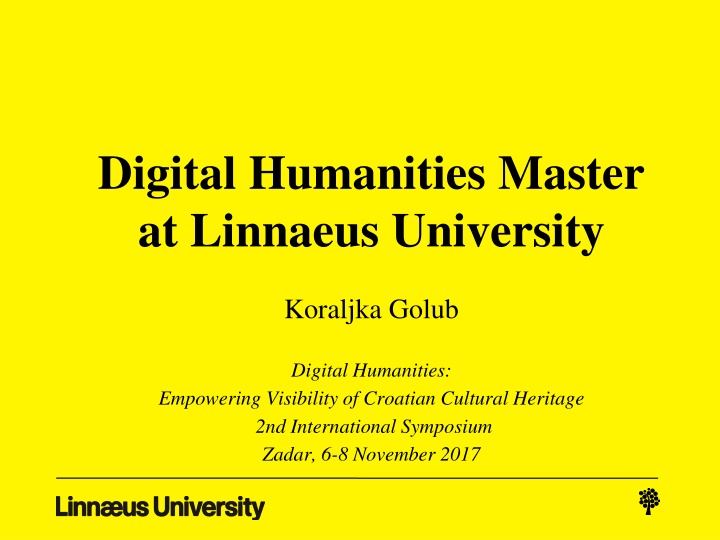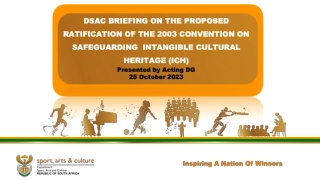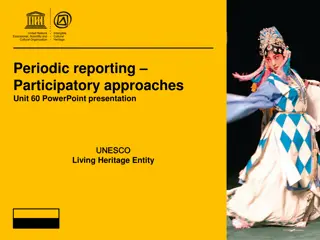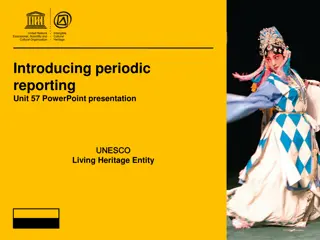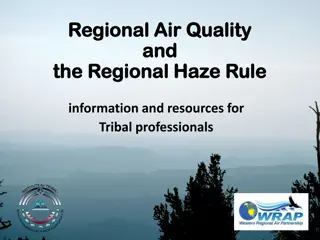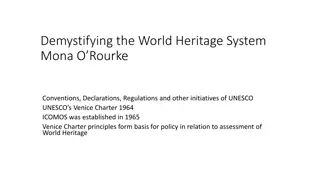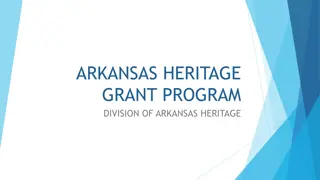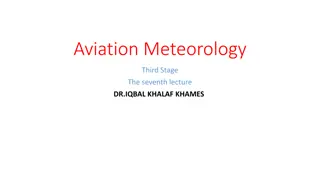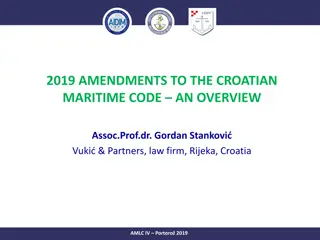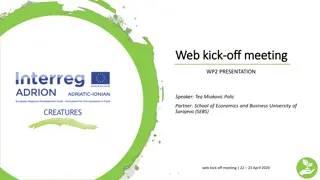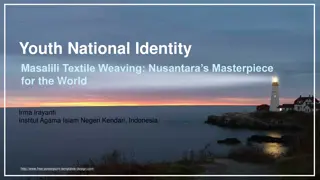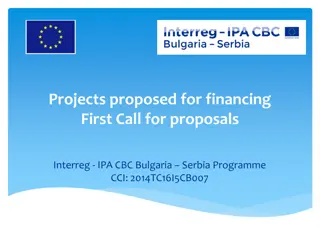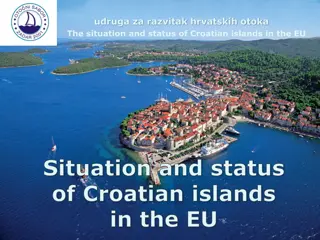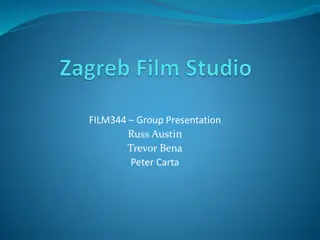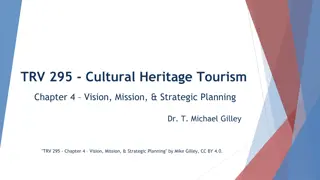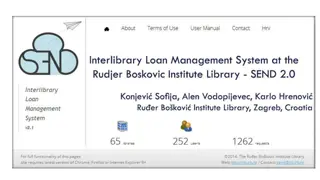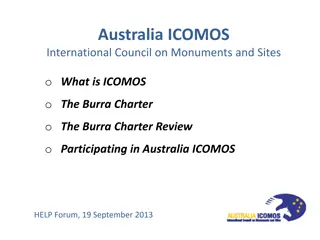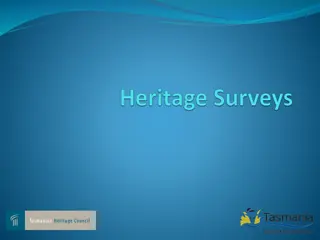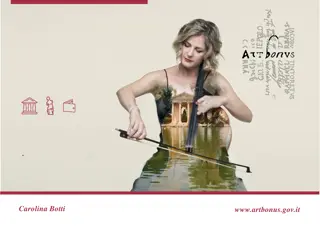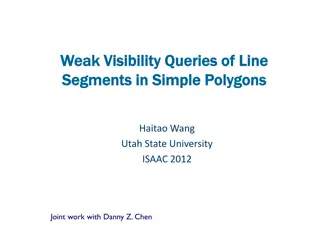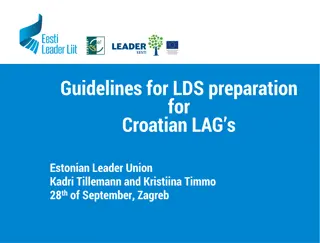Empowering Visibility of Croatian Cultural Heritage
This content highlights the Digital Humanities Master program at Linnaeus University by Koraljka Golub, focusing on empowering the visibility of Croatian cultural heritage. It discusses the Digital Humanities Initiative at LNU, DH education, interdisciplinary collaboration across faculties, and efforts to attract international Master students for cross-sectoral innovation.
Download Presentation

Please find below an Image/Link to download the presentation.
The content on the website is provided AS IS for your information and personal use only. It may not be sold, licensed, or shared on other websites without obtaining consent from the author.If you encounter any issues during the download, it is possible that the publisher has removed the file from their server.
You are allowed to download the files provided on this website for personal or commercial use, subject to the condition that they are used lawfully. All files are the property of their respective owners.
The content on the website is provided AS IS for your information and personal use only. It may not be sold, licensed, or shared on other websites without obtaining consent from the author.
E N D
Presentation Transcript
Digital Humanities Master at Linnaeus University Koraljka Golub Digital Humanities: Empowering Visibility of Croatian Cultural Heritage 2nd International Symposium Zadar, 6-8 November 2017
Digital Humanities Initiative at LNU https://lnu.se/en/digihum/ Why: address societal challenges Network 117 members in the network as of today 42 from LNU, 12 departments IEC with over 200 IT companies GLAM in the region and abroad Academic members from 17 countries on 5 continents DARIAH-EU How: Research + Education + Network Cross-sectoral Cross-disciplinary International Research 10 pilots in 2016 Funding received for 2017 Creating attractive information landscapes for cultural events DISA https://lnu.se/disa http://www.dariah.eu/typo3conf/ext/tmpl_dariah/Resources/Public/Img/dariah-eu.png
DH education at LNU: overall idea Vision Addressing future societal challenges would be eventually possible by highly skilled professionals whose education has been markedly enhanced by practice-informed education and joint, cross-sector innovation A (re)-affirmation of the value of humanities in particular, and academic practices in general An attractive mixture of compulsory and facultative courses Common core Disciplinary-specific electives
DH education at LNU: overall idea To formalize LNU s vision about cross-disciplinary collaboration 8 departments currently represented from 3 faculties (out of 5) Arts and Humanities: Archeology, Library and Information Science, Linguistics, Film and Literature, Media and Journalism Technology: Computer Science, Media Technology Business and Economics Address needs in the regional public and private sector Focus-group interview with representatives held in June 2016 Email interview with 13 experts from LNU network Cross-sectoral collaboration Project / thesis work Guest lectures
DH education at LNU: overall idea Increase number of (inter)national Master students at LNU Hybrid or distance English Free-of-charge for EU citizens Both for professionally- and scientifically-oriented students Both independent courses and full programme Collaborate with Swedish, Nordic, UK, DARIAH-EU partners and other international universities Joint courses / student projects Student exchange Guest lectures
Timeline Concept drafted in the autumn of 2016 Pilot testing of core courses starting in the autumn semester of 2017 Programming for Digital Humanities 15 ECTS, 50% https://lnu.se/en/course/programming-for-digital-humanities/vaxjo- distance-part-time-autumn/ Full programme to start 2019
Current concept of the Master in DH Humanities for Technologists (15 credits) or Programming for Humanities (15 credits) Digital Humanities Research Methods (7.5 credits) Introduction to Digital Humanities (7.5 credits) FIRST YEAR Elective course 1 (7.5 credits) Elective course 2 (7.5 credits) Elective course 3 (7.5 credits) Elective course 4 (7.5 credits) Elective course 1 (7.5 credits) Elective course 2 (7.5 credits) Master thesis (30 credits) SECOND YEAR Practicum (15 credits)
Core courses Humanities for Technologists (15 credits) or Programming for Humanists (15 credits) Digital Humanities Research Methods (7.5 credits) Introduction to Digital Humanities (7.5 credits) + Practicum + Master thesis
Electives A 45p elective module 3 suites: the Humanities, the Technologies, and the Business suite At least 15p need to be in the Technologies suite for students with the previous Humanities (or other soft ) education Equivalent in the Humanities for students with previous Computer Science (or related) education Some courses may belong to more than one suite, like the ones in computational linguistics
Electives in Humanities Digitization of cultural heritage Data and information organization and management Metadata The transmission of old texts Digital heritage management and communication Serious gaming as a resource in the fields of Humanities Digital translation Digital lexicography Data driven approaches to language and text Business models in value-based organisations and companies Participative policy development Digitalisation of working practices Technoscience studies Gender issues Digital media and methods for sampling and analysis User-generated photography and events Media intermedial multimodal theory
Electives in Technology Network society and internet cultures Cross-media design and production Interactive visualization methods and techniques Social media ecosystems Information visualisation Data literacy General DH application programmes Discipline-specific applications Data sets technologies Human computer interaction for DH Database design for DH Web design for DH Web programming for DH Data mining for DH
Electives in Business Digital Marketing Social Media and Consumerism Business strategy for GLAM
Practicum and Thesis Practicum Compulsory, 15p In collaboration with an external partner A pilot project based on actual needs in the public or private sector Project management, team working skills Ideally in pairs with each from different disciplinary background The basis for thesis writing
Programming for Digital Humanities (4ME501) The first pilot course https://lnu.se/en/course/programming-for-digital-humanities/vaxjo-distance-part- time-autumn/ 15 ECTS, 50% pace, English Distance mode with 6 obligatory meetings Presence either on campus or online 3 major blocks 1: Foundations of programming 2: Text manipulation and visualisation 3: Image, audio, animation Focus on programming using actual examples from humanities Popular: over 60 qualified applicants, University of Pisa sent all their students
Discussions on joint courses Sweden: Lund University, University of Bor s, University of Gothenburg Finland: University of Helsinki Denmark: Aarhus University Norway: Norwegian University for Science and Technology UK: University of London, Sheffield University
Workshop at 2nd DHN conference DHN: Digital Humanities in the Nordic Countries http://dig-hum-nord.eu Proposed and then co-organized by LNU, as the first of regular workshops on DH education in Nordic countries at DHN annual conferences As a direct result, a working group on education established with the DHN Presentations hosted by LNU, linked from DH website https://lnu.se/en/research/searchresearch/digital-humanities/workshop-higher- education-programs-in-digital-humanities-challenges-and-perspectives/ Now proposal submitted for 2nd workshop on DH education in Nordic countries at 3rd DHN conference 2018, Helsinki
DARIAH-EU A registry of courses related to DH in Europe https://registries.clarin-dariah.eu/ (universities need to register, so not complete) DARIAH teach http://dariah.eu/teach/ Open educational resources, quality controlled From DHN workshop Marianne Ping Huang: Digital Humanities education in DARIAH-EU
Nordic collaboration NORDFORSK submitted 3 May 2017 By DARIAH Nordic members Aim: establish Nordic Hub of DARIAH-EU Collaborate on DH education Joint electives, summer schools NEIC By all Nordic countries and UK Sweden in DARIAH represented by LNU Aim: analyze course material in the area of data analytics within large word corpora in Nordic countries, build missing parts, merge etc. To be submitted under next call
Other on-going efforts DH seminar series at Linnaeus University Collaboration with the new established LNUC Data Intensive Sciences and Applications (DISA) Cross-sectoral project with Nya Sm land Creating Attractive Information Landscapes for Cultural Events Establishment of an iSchool at LNU Sweden as a full partner in DARIAH-EU? Exploring possibilities
Main challenges to address Different disciplines and sectors Epistemological, conceptual and terminological differences May require additional resources to reach an understanding Administrative issues with cross-faculty and cross-university collaboration Current working structures are based on individual units LNU working example: Innovation through economics, technology and design by 3 faculties (link to FTK s version) In particularly challenging in terms of cross-university education Nordic working example: MA for language teachers, https://lnu.se/program/nordiskt-masterprogram-for- spraklarare/inriktning-engelska-distans-deltid-engelska-ht/
Main challenges to address The question of the job market for DH Low number of students at Master level at LNU / Sweden? Sustainability When DH becomes standard H LNU is a young university Can it attract that many students for a return on investment?
Summary Overall idea: fulfilling the vision of addressing future societal challenges cross* A common core + a large pool of electives Humanities Technologies Related efforts Challenges
Thank you! Feedback? Ideas? Interest in collaboration? Helsinki and V xj in March? Digital Humanities in the Nordic Countries calls for submissions for its 2018 conference in Helsinki, Finland, 7 9 March 2018, http://heldig.fi/dhn-2018/ Email: koraljka.golub@lnu.se
Sweden Undergraduate Lund Digitala kulturer: 3 years, campus, Swedish http://www.kultur.lu.se/utbildning/kandidatprogram/kandidatprogra m-i-digitala-kulturer/ Graduate G teborg Digital humaniora: 2 years, campus, Swedish and English http://utbildning.gu.se/program/program_detalj/?programid=H2DH U Post-graduate: courses only HumLab at Lund HumLab at Ume
Other Nordic countries Helsinki Digital Humanities: Minor Study Block, graduate, 25 ECTS Bergen Research training in Digital humanities, advanced level, 15 ECTS Aarhus Summer schools
Examples in other Europe Undergraduate Tend to be 3 years (180 ECTS), full time, campus mode Dundalk Institute of Technology (Ireland): Digital Humanities University College Cork (Ireland): Digital Humanities and Information Technology King's College London (UK): Digital Culture University of Wales (UK): Heritage Studies with Digital Humanities Leipzig University (Germany): Digital Humanities University of W rzburg (Germany): Digital Humanities
Graduate Tend to be 1 to 2 years full-time, campus - KU Leuven (Belgium): Digital Humanities - Maynooth University (Ireland): Digital Humanities - Swiss Federal Institute of Technology in Lausanne: Digital Humanities - University of W rzburg: Digital Humanities - UCL (UK): Digital Humanities
